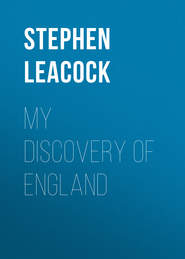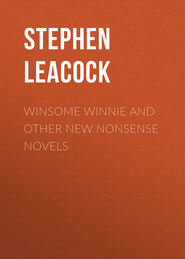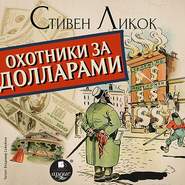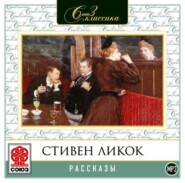По всем вопросам обращайтесь на: info@litportal.ru
(©) 2003-2025.
✖
The Hohenzollerns in America
Автор
Год написания книги
2019
Настройки чтения
Размер шрифта
Высота строк
Поля
"Come, come, that's something anyway. You're on the right track, and you must not be discouraged if you're not up to the Turkish standard yet. You must remember, as I told you before, that Turkey leads the world in all ideas of government and finance. Take the present situation. Here we are, bankrupt—pass me the champagne, Toomuch, and sit down with us—the very first nation of the lot. It's a great feather in the cap of our financiers. It gives us a splendid start for the new era of reconstruction that we are beginning on. As you perhaps have heard we are all hugely busy about it. You notice my books and papers, do you not?" the Sultan added very proudly, waving his hand towards a great pile of blue books, pamphlets and documents that were heaped upon the floor beside him.
"Why! I never knew before that you ever read anything!"
I exclaimed in amazement.
"Never did. But everything's changed now, isn't it, Toomuch? I sit and work here for hours every morning. It's become a delight to me. After all," said Abdul, lighting a big cigar and sticking up his feet on his pile of papers with an air of the deepest comfort, "what is there like work? So stimulating, so satisfying. I sit here working away, just like this, most of the day. There's nothing like it."
"What are you working at?" I asked.
"Reconstruction," said the little man, puffing a big cloud from his cigar, "reconstruction."
"What kind of reconstruction?"
"All kinds—financial, industrial, political, social. It's great stuff. By the way," he continued with great animation, "would you like to be my Minister of Labour? No? Well, I'm sorry. I half hoped you would. We're having no luck with them. The last one was thrown into the Bosphorous on Monday. Here's the report on it—no, that's the one on the shooting of the Minister of Religion—ah! here it is—Report on the Drowning of the Minister of Labour. Let me read you a bit of this: I call this one of the best reports, of its kind, that have come in."
"No, no," I said, "don't bother to read it. Just tell me who did it and why."
"Workingmen," said the Sultan, very cheerfully, "a delegation. They withheld their reasons."
"So you are having labour troubles here too?" I asked.
"Labour troubles!" exclaimed the little Sultan rolling up his eyes. "I should say so. The whole of Turkey is bubbling with labour unrest like the rosewater in a narghile. Look at your tablets, Toomuch, and tell me what new strikes there have been this morning."
The aged Secretary fumbled with his notes and began to murmur—"Truly will I try with the aid of Allah—"
"Now, now," said Abdul, warningly, "that won't do. Say simply 'Sure.' Now tell me."
The Secretary looked at a little list and read: "The strikes of to-day comprise—the wig-makers, the dog fanciers, the conjurers, the snake charmers, and the soothsayers."
"You hear that," said Abdul proudly. "That represents some of the most skilled labour in Turkey."
"I suppose it does," I said, "but tell me Abdul—what about the really necessary trades, the coal miners, the steel workers, the textile operatives, the farmers, and the railway people. Are they working?"
The little Sultan threw himself back on his cushions in a paroxysm of laughter, in which even his ancient Secretary was feign to join.
"My dear sir, my dear sir!" he laughed, "don't make me die of laughter. Working! those people working! Surely you don't think we are so behind hand in Turkey as all that! All those worker's stopped absolutely months ago. It is doubtful if they'll ever work again. There's a strong movement in Turkey to abolish all NECESSARY work altogether."
"But who then," I asked, "is working?"
"Look on the tablets, Toomuch, and see."
The aged Secretary bowed, turned over the leaves of his "tablets," which I now perceived on a closer view to be merely an American ten cent memorandum book. Then he read:
"The following, O all highest, still work—the beggars, the poets, the missionaries, the Salvation Army, and the instructors of the Youths of Light in the American Presbyterian College."
"But, dear me, Abdul," I exclaimed, "surely this situation is desperate? What can your nation subsist on in such a situation?"
"Pooh, pooh," said the Sultan. "The interest on our debt alone is two billion a year. Everybody in Turkey, great or small, holds bonds to some extent. At the worst they can all live fairly well on the interest. This is finance, is it not, Toomuch Koffi?"
"The very best and latest," said the aged man with a profound salaam.
"But what steps are you taking," I asked, "to remedy your labour troubles?"
"We are appointing commissions," said Abdul. "We appoint one for each new labour problem. How many yesterday, Toomuch?"
"Forty-three," answered the secretary.
"That's below our average, is it not?" said Abdul a little anxiously. "Try to keep it up to fifty if you can."
"And these commissions, what do they do?"
"They make Reports," said Abdul, beginning to yawn as if the continued brain exercise of conversation were fatiguing his intellect, "excellent reports. We have had some that are said to be perfect models of the very best Turkish." "And what do they recommend?"
"I don't know," said the Sultan. "We don't read them for that. We like to read them simply as Turkish."
"But what," I urged, "do you do with them? What steps do you take?"
"We send them all," replied the little man, puffing at his pipe and growing obviously drowsy as he spoke, "to Woodrow Wilson. He can deal with them. He is the great conciliator of the world. Let him have—how do you say it in English, it is a Turkish phrase—let him have his stomach full of conciliation."
Abdul dozed on his cushions for a moment. Then he reopened his eyes. "Is there anything else you want to know," he asked, "before I retire to the Inner Harem?"
"Just one thing," I said, "if you don't mind. How do you stand internationally? Are you coming into the New League of Nations?"
The Sultan shook his head.
"No," he said, "we're not coming in. We are starting a new league of our own."
"And who are in it?"
"Ourselves, and the Armenians—and let me see—the Irish, are they not, Toomuch—and the Bulgarians—are there any others, Toomuch?"
"There is talk," said the Secretary "of the Yugo-Hebrovians and the Scaroovians—"
"Who are they?" I asked.
"We don't know," said Abdul, testily. "They wrote to us. They seem all right. Haven't you got a lot of people in your league that you never heard of?"
"I see," I said, "and what is the scheme that your league is formed on?"
"Very simple," said the Sultan. "Each member of the league gives its WORD to all the other members. Then they all take an OATH together. Then they all sign it. That is absolutely binding."
He rolled back on his cushions in an evident state of boredom and weariness.
"But surely," I protested, "you don't think that a league of that sort can keep the peace?"
"Peace!" exclaimed Abdul waking into sudden astonishment. "Peace! I should think NOT! Our league is for WAR. Every member gives its word that at the first convenient opportunity it will knock the stuff out of any of the others that it can."
The little Sultan again subsided. Then he rose, with some difficulty, from his cushions.














